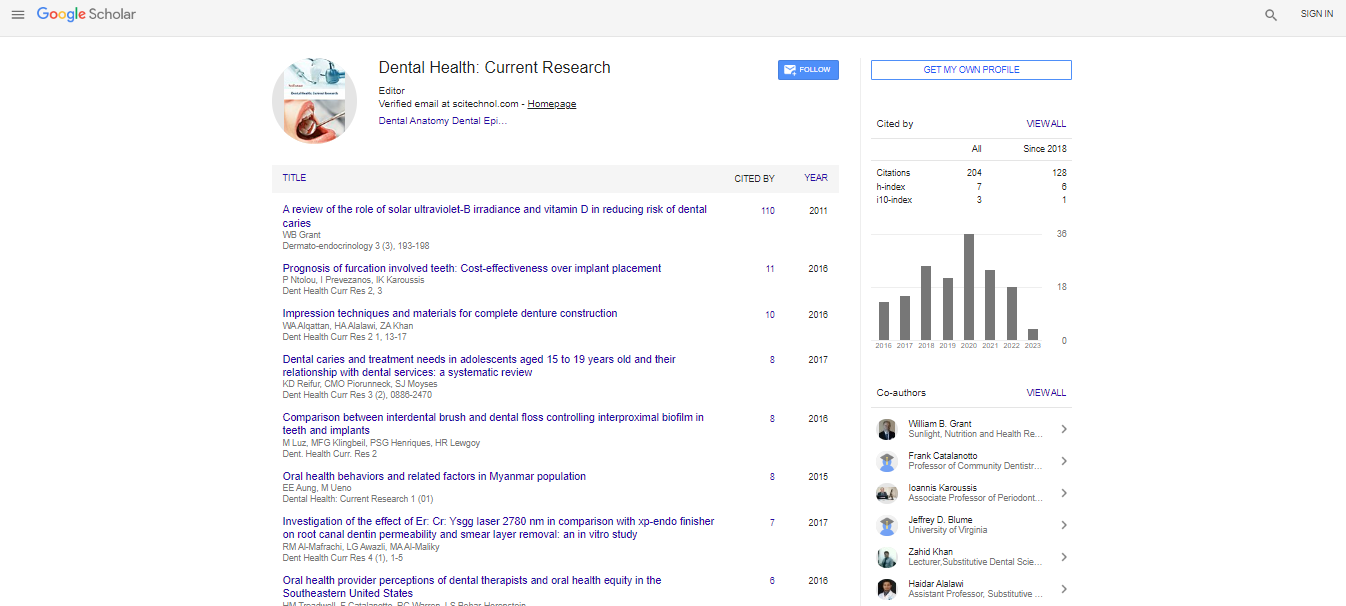Commentary, Dent Health Curr Res Vol: 7 Issue: 11
Fluoride Supplements And How Does Fluoride Prevent Cavities?
Jiiang-Huei Jeng*
School of Dentistry, National Taiwan University, Taiwan
- *Corresponding Author:
- Jiiang-Huei Jeng
School of Dentistry, National Taiwan University, Taiwan
E-mail: Jenghu22edu@gmail.com
Received Date: November 05, 2021; Accepted Date: November 22, 2021; Published Date: November 29, 2021
Citation: Jeng JH (2021) Fluoride Supplements and How Does Fluoride Prevent Cavities? Dent Health Curr Res 7:11. 172.
Copyright: © All articles published in Dental Health: Current Research are the property of SciTechnol, and is protected by copyright laws. “Copyright © 2021, SciTechnol, All Rights Reserved.
Keywords: Dental, Fluoride, Demineralization, Re-mineralization
Commentary Article
Dental plaque at the enamel surface consists of a huge variety of cariogenic (cavity-causing) bacteria, which enhance the procedure of tooth loss and demineralization. These bacteria inhibit reparative techniques within tooth, leading to tooth decay and cavities.
Fluoride has both preventive and therapeutic consequences against dental cavities. When consumed in appropriate amounts, this mineral accelerates the process of re-mineralization and hampers demineralization.
Cariogenic bacteria metabolize carbohydrates and release acids. As the pH of the mouth is going down, fluoride is liberated from plaque and adheres to the calcium and phosphate launched from the demineralized tooth surface. This in the end forms a superior enamel crystal structure. This recently formed enamel structure is more resistant to acids, and is high in fluoride concentration and low in carbonate content.
Some clinical research have additionally validated that when fluoride is consistently present at low concentrations in the oral cavity, it has the property to inhibit the action of cariogenic bacteria like Streptococcus mutans by decreasing their acid production.
Fluoride is a mineral that happens clearly in lots of foods and water. Minerals are lost (demineralization) from a tooth’s enamel layer when acids -- formed from plaque bacteria and sugars withinside the mouth -- attack the enamel. Minerals such as fluoride, calcium, and phosphate are redeposited (remineralization) to the enamel layer from the foods and waters ate up. Too much demineralization with out sufficient remineralization to restore the enamel layer leads to tooth decay.
Fluoride Supplements
If you’re worried that your toddler isn’t getting sufficient fluoride, ask your pediatrician or dentist about a prescription for fluoride dietary supplements. Fluoride dietary supplements are exceptional for kids between 6 months and 16 years old who do not drink fluoridated water. They are available in liquid form for younger kids and tablets for older children and teens.
A dentist or pediatrician also can prescribe fluoride rinses and gels in case your toddler wishes a higher level of fluoride than dietary supplements can provide. Either way you go, continually make certain to cautiously supervise your kids when they use any fluoride item and keep fluoride dietary supplements out of reach from children.
Proper oral fitness starts with a good plan of assault. That way brushing at the least twice a day and flossing daily to remove plaque that collects between each tooth, and don’t forget: schedule regular dental cleanings.
In addition, people with sure situations can be at multiplied chance of enamel decay and might consequently advantage from extra fluoride remedy. They consist of human beings with:
Dry mouth conditions: Also known as xerostomia, dry mouth because of diseases together with Sjögren’s syndrome, certain medications (such as hypersensitive reaction medications, antihistamines, antianxiety drugs, and high blood stress drugs), and head and neck radiation treatment makes someone greater at risk of tooth decay. The lack of saliva makes it more difficult for food particles to be washed away and acids to be neutralized.
Gum disease: Gum disease, additionally known as periodontitis, can reveal more of your tooth and tooth roots to bacteria growing the threat of tooth decay. Gingivitis is an early stage of periodontitis.
Presence of crowns and/or bridges or braces: These treatments can put tooth at risk for decay on the factor wherein the crown meets the underlying tooth shape or around the brackets of orthodontic appliances.
 Spanish
Spanish  Chinese
Chinese  Russian
Russian  German
German  French
French  Japanese
Japanese  Portuguese
Portuguese  Hindi
Hindi 